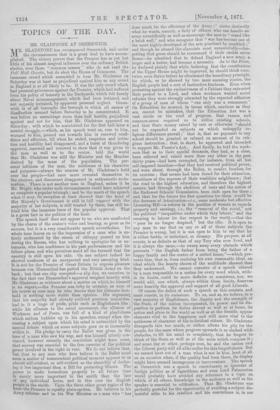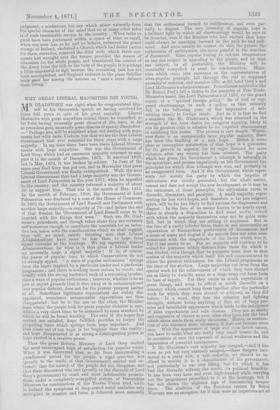TOPICS OF THE DAY.
MR. GLADSTONE AT GREENWICH.
M' R. GLADSTONE has reconquered Greenwich, and under I the circumstances that is a great deal to have accom- plished. The victory proves that the Premier has as yet lost little of his almost magical influence over the ordinary British elector, over those "common masses " who do not read the Pall Mall Gazette, but do elect the House of Commons. The immense crowd which assembled to hear Mr. Gladstone on Saturday was at least as prejudiced against him as any crowd in England is at all likely to be. It was the only crowd which had personal grievances against the Premier, which had suffered from his policy of honesty in the Dockyards, which felt keenly about Naval mismanagement, which had been irritated, and not unjustly irritated, by apparent personal neglect. Green- wich is of all boroughs the borough in which all causes of disaffection seemed before Saturday to be concentrated. It was before an assemblage more than half hostile, prejudiced against and not for him, that Mr. Gladstone appeared on Saturday ; with which he maintained for the first half-hour a mental struggle,—which, as his speech went on, rose to him, warmed to him, poured out towards him in renewed confi- dence and affection, till when he ended, suspicion and irrita- tion and hostility had disappeared, and a burst of thundering approval, renewed and renewed to show that it was given to the man as well as to the orator, told the world that Mr. Gladstone was still the Minister and the Member desired by the mass of the population, The per- sonal loftiness of the man, the nobleness of his character and purposess—always the sources of Mr. Oladstone's hold over the people—had once more revealed themselves to the electors, and discontent disappeared in enthusiastic accla- mation. There is not another man in England, unless it be Mr. Bright, who under such circumstances could have achieved so complete a popular triumph ; and be the merit of the speech what it may, its reception at least showed that the head of Her Majesty's government is still in full rerppeet with the majority of her subjects, is still trusted by them, has still be- hind him the immense force of the popular approval. That is a great fact in the politics of the hour.
The speech itself does not appear to us, who are unaffected by the charm of the orator's voice and bearing, so great as its success, but it is a very considerable speech nevertheless. Its whole tone leaves on us the impression of a man who is en- tirely undaunted by the storm of obloquy poured on him during the Recess, who has nothing to apologize for or ex- tenuate, who has confidence in his past performances and his future plans, and who perceives amid all the turmoil that the country is still upon his side. On one subject indeed he showed weakness of an unexpected and very annoying kind. It is not for the Premier of Great Britain to express pleasure because von Blumenthal has patted the British Army on the back ; but that one slip excepted—a slip due, we conceive, to the fact that von Blumenthal's approval weighed heavily with Mr. Gladstone as evidence about a matter on which he himself is no expert,—the Premier was lofty to serenity, as sure of his course as man may be who knows that his ultimate foot- hold is nothing more stable than opinion. His argume,4 that his majority had already outlived previous majorities, had in it a tinge of pride, pride such as Englishmen like ; while his allusion to the social movement, the alliance of Workmen and of Peers, was full of a kind of playfulness which seldom bubbles up in his speeches, except when dis- cussing a subject upon which his mind is untroubled by the mental debate which on some subjects goes on so incessantly within it. IIis pledge to carry the Ballot was given in the tone of a man who saw his way, and was himself utterly con- vinced, however recently the conviction might have come, that secrecy was essential to the free exercise of the political power involved in the right to vote, We do not believe that, but that to any man who does believe it the Ballot must seem a matter of transcendent political moment appears to us almost self-evident, as self-evident as the absurdity of declar- ing it less important than a Bill for protecting Miners. The power to make horseshoes properly to all future time is surely more important to the smith than the fate of any individual horse, and in this case the English people is the smith. Upon the three other great topics of the hour the Premier is equally plain-spoken. He believes in his Army reforms and in his War Minister as a man who "has
done much for the efficiency of the Army ;" states distinctly what he wants, namely, a body of officers who can handle an- army scientifically as well as encourage the men to "stand like- a brick wall," and who recognize that "war has become one of the most highly-developed of the arts practised by mankind ;" and though he abused the alarmists most unmercifully—for- getting that geese should be reverenced if their cackle saves Rome—he admitted that to defend England a new army, a larger and a better, had become a necessity. As to the Peers„ he declared plainly that while believing that the constitutiont of the Upper House might be improved, he should think once, twice, even thrice before he eliminated the hereditary principle, for which, as he showed by two most amusing stories, the- English people had a sort of instinctive kindness. Even when protesting against the exclusiveness of a Cabinet they entrusted their protest to a Lord, and when workmen wanted social reforms they were strongly attracted by the reported adhesion of a group of men of whom "one only was a commoner." On Education he averred, in terms which, cautious as they are, cannot be mistaken, that the Education Act was a vast stride on the road of progress, that reason and. common-sense required us to utilize existing schools, and that State money raised by rate or otherwise "should. not be expended on subjects on which unhappily re- ligious differences prevail ;" that is, that no payment to any school should be granted or refused on account of its reli- gious instruction ; that, in short, he approved and intended.. to support Mr. Forster's Act. And finally, he told the work- men that as to their special demands, they had, as a class, been relieved and raised more than any other in the past thirty years—had been exempted, for instance, from all but self-imposed taxation—that they had received political power,. and were about, through the Ballot, to receive freedom for its exercise ; that means had been found for their educationr sometimes at the expense of their wealthier neighbours ; that the road to the highest education, and therefore the highest. careers, had through the abolition of tests and the action of the Endowed Schools' Commission, been cleft open for them;. and that for the future the first questions for them would be the decrease of intoxication—i.e., some moderate but effective. Licensing Bill—a reform in the position of women as regards, property and earnings, i.e., the "removal of the social," not the political "inequalities under which they labour," and the- securing to labour its due respect in the world,—that the- " poor be no longer despised," but the idle. It is open to- any man to say that on any or all of these subjects the- Premier is wrong, but it is not open to him to say that he is either feeble, or indistinct, or dreamy. His purpose, at all events, is as definite as that of any Tory who ever lived, and it is always the same,—to sweep away every obstacle which prevents "the English father from being the father of a happy family and the centre of a united home,"—which pre-- vents him, that is, from realizing his own reasonable ideal, an ideal which the hearty cheers of the multitude showed that they understood. We cannot conceive of a speech uttered by a man responsible to a nation for every word which, with- in its limits, could be more definite or consistent, nor, wet would add, one which, always within those limits, deserves more heartily the approval and support of all good Liberals.
Of course the defect of such a speech as this consists, and must consist, in its omissions. To us, and as, we believe, to a vast majority of Englishmen, the dignity and the strength of the State, of the nation incorporated, its power and its dis- position to perform its duties abroad as well as at home, its action and place in the world as well as at the fireside, appear elements vital to the happiness and still more vital to the- nobleness of character of the individual citizen. Mr. Gladstone disregards this too much, or rather allows his pity for the- people, for the mass whose progress upwards is so choked with obstacles, to fill his mind so completely, that he forgets to- think of the State as well as of the units which compose it and some day or other, perhaps soon, he and the nation and the Liberal party will all alike suffer for this forgetfulness. But we cannot have out of a man what is not in him, least of all. on an occasion when, if the quality had been there, its display might have seemed incongruous or inconvenient. The speech at Greenwich was a speech to constituents as ignorant of foreign polities as of logarithms, and even Lord Palmerston would probably have avoided any reference to a topic on which, of all others, knowledge in the audience as well as the speaker is essential to edification. That Mr. Gladstone waa probably grateful for the opportunity of avoiding a subject dis- tasteful alike to his intellect and his convictions is, in our
judgment, a misfortune, but one which arises naturally from the special character of the mind that on so many other sides is of such inestimable service to the country. When tasks so great have been performed within a space of time so small, when one man has, as he and we believe, redressed the grand wrongs of Ireland, abolished a Church which had defied justice for three centuries, removed the chief evils which three con- quests had wrought into the tenure, provided the means of education for the whole people, and transferred the control of the Army from the rich to the body of the people, it is perhaps a little ungrateful to sigh because the remaining task has not been accomplished, and England restored to the place Schiller truly gave her among the nations as "man's stout defence from wrong."



































 Previous page
Previous page